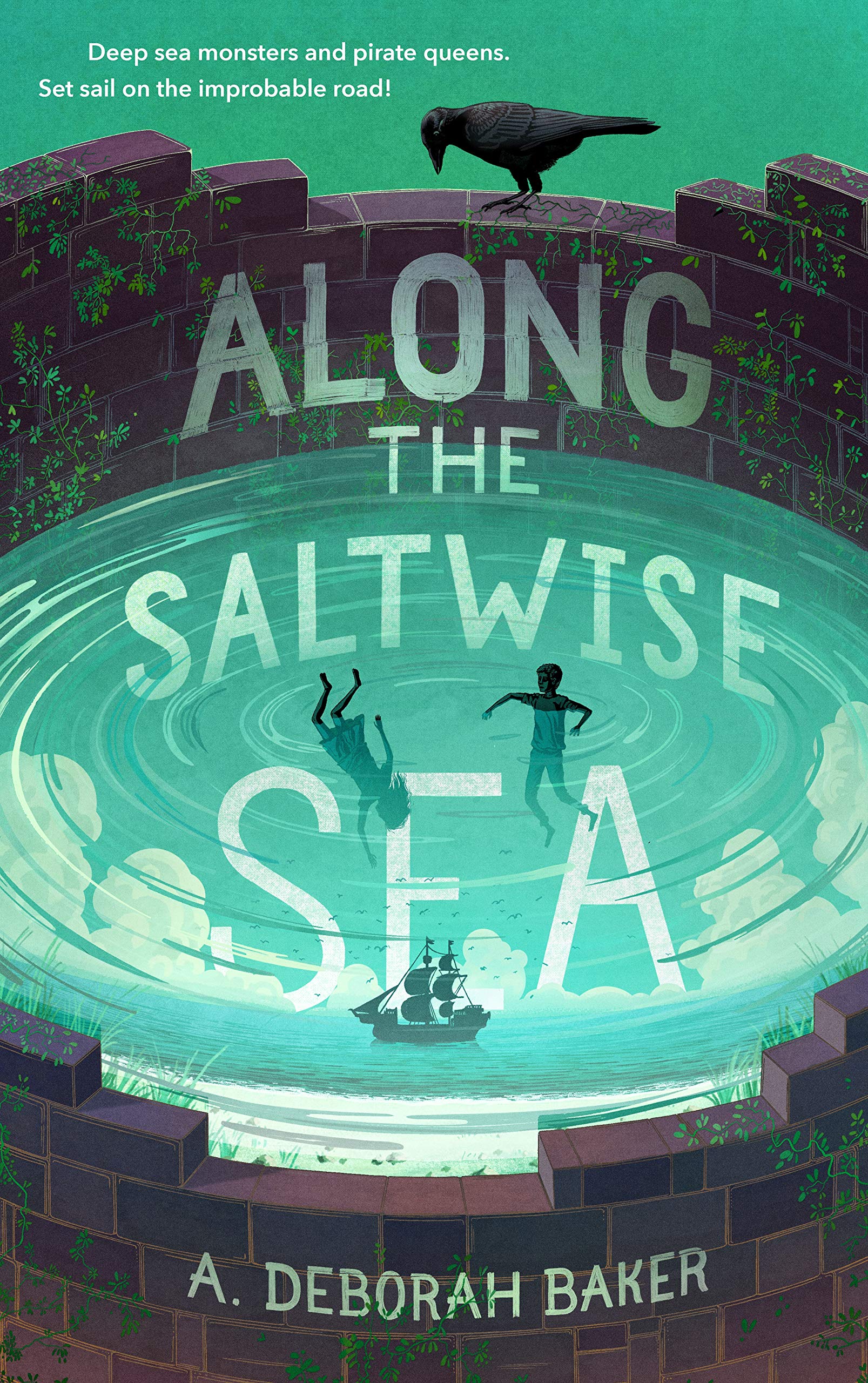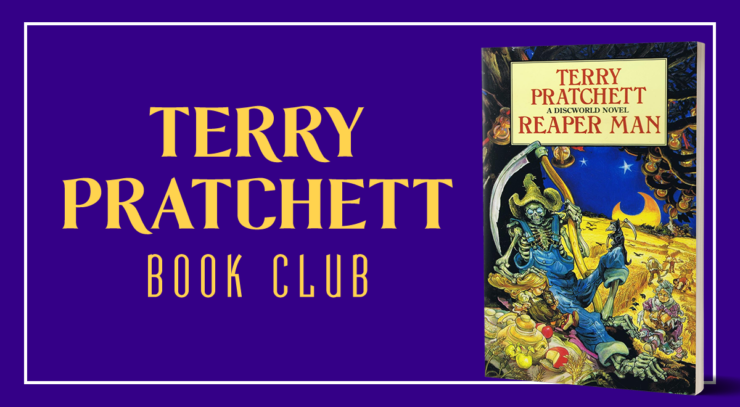We’re gonna sharpen this scythe on daylight and see where that gets us. Let’s continue with Reaper Man.
Summary
Bill Door sharpens the scythe on cloth, getting down to Miss Flitworth’s unused wedding silk. He still doesn’t believe it’s sharp enough. Finally, he gets it to a place where he’s happy. Miss Flitworth sees one of the auditors, likens them to revenue folks, and suggests Bill get on with his work for the day before the new Death comes, since it’ll keep his mind off things. Windle Poons and Schleppel go to meet Mrs. Cake and find out about life force build up. Modo gets eaten by a living compost heap and the wizards try to help, freeing him and running from said heap, but it keeps stalking them. Ridcully throws a bottle of Wow-Wow Sauce into it, and the heap explodes everywhere. They decide to move on to the other compost heaps. Bill goes to meet Simnel, the town blacksmith who is far too busy creating machinery to replace old farming tools. Bill asks him to melt down his old scythe. Poons gets the chance to talk to Mrs. Cake’s spirit guide One-Man-Bucket, which confirms his suspicions that all the snowglobes cropping up are some form of egg that will eventually hatch. One-Man-Bucket agrees, and thinks they’re headed to the “mobile stage” first. Poons makes to leave, but not before asking Mrs. Cake’s daughter Ludmilla to accompany him, so he can set her (a werewolf) up with Lupine (the wereman).
Buy the Book


Along the Saltwise Sea
Poons brings Ludmilla and Lupine and breaks into the university Library where the Librarian won’t let them in. The school itself is now dealing with attacks from wire rolling carts, and Lupine gets hit by one, prompting Ludmilla to worry over him. Poons enlists the Librarian’s help in figuring out the deal with the mobile stage of cities and what’s going on with the snowglobes. The wizards are having troubles of their own with the wire carts and the fact that every time they curse, they seem to bring said curse into being.
Simnel tries out his harvesting machine, and after a few false starts and jeers from the townspeople, he gets the thing working. Bill isn’t having it and tries to work as fast as the machine—he nearly manages it too, and is brought home to Miss Flitworth, exhausted from the effort. As they talk about how he’s feeling and whether or not Simnel will actually melt down the scythe as asked, a terrible hail storm starts up and they have to rush to save their harvest. Simnel decides that he cannot destroy Bill’s scythe and resolves to give him his money back tomorrow. The wizards find that all trolleys in the city are undergoing a sort of mass exodus and there’s nothing they can do to put a stop to things without some heftier magic, but the trolleys turn on them. Poons believes he’s stumbled upon what’s going on with the snowglobes, and thinks it might be the coming death of a city.
A new Death shows up, posing against the stormy skyline. Miss Flitworth asks what they can do, and Bill knows the answer is nothing, but they take the Sal and get onto Binky, and ride to town to get the scythe. Miss Flitworth asks Bill if he has any last words, to which he replies “I DON’T WANT TO GO.” He moves out of sight, and midnight chimes and the Auditors of Reality are present, and the New Death arrives in the square, asking after Bill. It almost moves on the Sal first, but then a voice behind it tells him to drop its scythe. Back in Ankh-Morpork, music begins (for a definition of music) that seems to be drawing in humans, but Windle’s undead pals are unaffected by the noise and converge to investigate.
Commentary
How. Did I forget. That Death and the Tenth Doctor aimed for the same last words. How did I forget that. HOW.
They’re great last words, obviously. Vulnerable and evocative. But now I’m gonna be thinking about that for the rest of the day, and also that the readings of those lines from both of those characters are probably spiritual opposites. It’s so good.
So, the new Death arrives and it is more of a vacant specter, dramatic and unforgiving and cold. (With a skeletal horse, just to drive home the lack of substance.) A different imagining that humans have of Death, to be sure. Calling the new boss “it” is pointed, as Death’s seeming “personhood” and use of a gendered pronoun is what drew the Auditors to him in the first place, but I’m gonna say a thing that is not at all surprising coming from me: I always thought Discworld Death should have been genderless or nonbinary. Reason being, it always seemed to me that Death was male because he was being written in a defaulted state, and current culture still (always) views male perspective as default. “They” pronouns weren’t quite as common in the 90s and plenty of agender and nonbinary people still use “he” or “she” pronouns, so to me, Death still reads genderless. And I like him that way.
Though there’s something else to be said here about the idea of a gendered pronoun being an indication of identity as the Auditors view it in Death’s case. I’m fascinated by the conceit because it’s something that we genuinely don’t have figured out in regard to sentience and gender’s relationship to it. Trans people (myself included) like to talk about how “gender is a construct,” but that doesn’t mean that gender’s unreal, despite people taking the phrase that way. It means that gender is a concept made of cultural, social, and historical cues that we all pick up on and may interpret differently. My dog doesn’t have a concept of “gender,” no matter what anyone thinks (remember, sex organs are not gender), and so when people ask me “Is your dog a boy or a girl?” my genuine impulse is to shrug because it’s not like he cares what pronoun they use. People ask because many humans care… which gives me some questions about the Auditors and Azrael.
But then, we can’t actually get to those questions until the end of the book next week. So I’ll pick up my thoughts then.
I do appreciate from the worldbuilding standpoint that Pratchett explains, even in the vaguest terms, that people can share or give away life to others, even if he doesn’t explain how or why. Just to make sense of little Sal existing jointly on Death’s hourglass, even a little. It doesn’t take much! Things don’t always need to be over-explained, just given enough space on the page to make it clear that the author isn’t ignoring it.
We’ve got another situation here with Mrs. Cake and the spirit guide stuff, and this spirit guide’s culture clearly being modeled after a Native American tribe. It’s awkward all over again, just as bad as Madame Tracy in Good Omens, and in large part due to his manner of death: One-Man-Bucket dies because he’s hit by a cart when he’s drunk. So we’re running into the stereotypes around Native Americans and alcoholism, and if this were intending to be more of a parody of the ways white writers often handle these stereotypes it might work, but… it doesn’t really come off that way. So that’s rough reading.
While Windle and his Fresh Start pals are supposed to get more focus in the narrative due to being an allegory for minority rights groups (which sort of works? But is also kinda pointless here?), I’m afraid I’m stuck on Ridcully and the wizards deciding that destroying a compost heap makes them “mean” now, and that promptly backfiring as their curse words come to life. Sorry, I just… I’m very invested in their crusade against shopping carts. Ineffectual heroics are usually the best kind.
Asides and little thoughts:
- Pratchett is typically excellent at writing different types of British vernacular styles into his dialogue, and it’s always fascinating to me when one comes off more strongly than others. For example, in my head, Mrs. Cake sounds like she’s from Wells. (Think most of the townspeople in Hot Fuzz—that accent.)
- There are many ways in which Ridcully and I will never see eye to eye, but roaring “Eat hot sauce!” after vanquishing a foe is one thing we will always have in common.
- The Combined Harvester competition gets into all those American folklore stories like John Henry and Paul Bunyan, which is a fun thing to see here because the idea of conflating the march of industrial progress with Death being outmatched in his own job is a cool little parallel. Our Discworld Death likes to handle things the old-fashioned way, thank you very much.
- The fact that Bill tells Simnel to “kill” his scythe before he realizes he should say “destroy” because the concept of destruction to him is death, so why would he think to use another word?
Pratchettisms:
Carmen Miranda could have worn that hat to the funeral of a continent.
“Don’t see why I should go around helpin’ wizards who call me good woman when I was only trying to help.”
A cabbage stalk dropped softly onto the Dean’s head.
He’d never thought it was possible to have so much fun in his own university.
The swear-words settled amiably on his hat.
There was a faint violet corona around the blade, caused by the drafts in the room driving luckless air molecules to their severed death.
BECAUSE OF DRAMA, MISS FLITWORTH. THE KIND OF DEATH WHO POSES AGAINST THE SKYLINE AND GETS LIT UP BY LIGHTNING FLASHES, said Bill Door, disapprovingly, DOESN’T TURN UP AT FIVE-AND-TWENTY PAST ELEVEN IF HE CAN POSSIBLY TURN UP AT MIDNIGHT.
Next week we finish the book!










